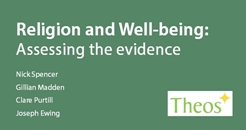 Active faith is key factor in increased well-being
Active faith is key factor in increased well-being
Theos recently published a report on Religion and Well-being:Assessing the evidence, authored by Nick Spencer, Gillian Madden, Clare Purtill and Joseph Ewing
They looked at nearly 140 studies on the relationship between religion and well-being and uniquely tried to reach conclusions about how the degree of active involvement in religion affects well-being and also what aspects of health were most affected. They conclude that the more serious, genuinely held and practically-evidenced a religious commitment is, then the greater the positive impact it is likely to have on well-being. Higher levels of involvement in religion are more beneficial to mental health overall.
Social religious participation i.e. active and regular participation in services or volunteering, evidenced the strongest positive correlation across all measures of well-being.
There was a strong positive correlation between personal religious participation i.e. acts of private devotion, and well-being, most notably mental health.
Religious belief i.e. personal belief in God and assent to doctrines, was found to have a largely positive, but more varied, impact on the different measures of well-being.
Subjective religiosity i.e. the degree of influence that beliefs have on a person’s decisions and lifestyle, had mixed effects on different indicators of well-being, particularly in the categories of physical health and health supporting behaviours.
A verse to think about: "The mind governed by the flesh is death, but the mind governed by the Spirit is life and peace." Romans 8v6 NIV
Download the report here
Retweet about this article:
Geoff Knott, 02/08/2016